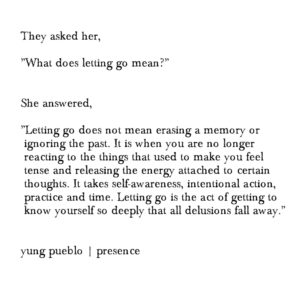One of the most vague and misunderstood terms in the modern self-help lexicon is the term conscious.
One source of this confusion lies behind the multiple meanings behind the word. To the uninitiated, the term conscious simply means the opposite of unconscious, whether it be a person who is asleep, in a coma, or just got hit over the back of the head with a frying pan.
Another problem is that the term has been used in different psychological circles to mean different things. Sigmund Freud used the term conscious to mean the small piece of mental activity we are aware of, and then put the unconscious at the bottom layer of his topographical model of the mind. Most often represented as an iceberg, the model also includes the subconscious mind that we could potentially make conscious.

Carl Jung also was keen on the term and became popular for his theories on the personal and collective unconscious, which included universal concepts known as archetypes that shape human behavior. He is still known today for popular quotes such as, “One does not become enlightened by imagining figures of light but by making the darkness conscious.” and “Until you make the unconscious conscious, it will direct your life and you will call it fate.”
But there is a third and much more important meaning behind the term conscious which directly connects us to deeper spiritual realities. This meaning is based on the metaphysical and spiritual perspective that most people are asleep. Whether a person is physically awake or not, from a spiritual perspective, they are still living in a dream and are caught up in a world of illusion.
This illusion is often described as maya and the average person is caught up in the “divine play” of life–also known as lila. To help understand these concepts, imagine the entire human race is greatly engrossed in a movie, staring at the moving pictures on the screen. They are locked into a “trance” and believe everything that happens on the screen is reality. To become “conscious” is the process of getting up, turning around, and seeing the true source of the images.
Thus we can use the term conscious or awake to mean coming to any greater understanding of reality.
This is the reason the term “Buddha” actually means “awakened one”. The Shakyamuni Buddha most people associate with Buddhism was just one person who became awake to the nature of reality. The technique of Vipassana meditation, where Vipassana means insight, is designed for the practitioners to have true insight into the nature of reality; a path of awakening from the illusions of the world.
When it comes to being in a truly conscious, intimate relationship, we can bring this same attitude of dissolving illusion, undoing common narratives around love, and awakening to the truth of the moment.
Knowing all this, here are some signs you are in a true conscious partnership:
You See Your Partner as a Manifestation of the Divine
One of the biggest transformations on the conscious path is we no longer get so caught up in superficial differences between people. Rather, we see all human beings as essentially good, as individual sparks of one unique divine light. You might call that spark Buddha nature, Christ consciousness, spirit, The Great Mother, love, source, whatever word resonates most deeply with you or you might not even use words at all.
The great fifteenth century mystic Indian Kabir put it beautifully when he wrote,
The Guest is inside you, and inside me.
You know the sprout is hidden inside the seed.
This guiding force led many great saints and mystics to do great things in the world. It is one of the things that propelled Mother Theresa, who embraced the sick, poor and dying with dignity by seeing everyone as Jesus in disguise:
Seeking the face of God in everything, everyone, all the time, and his hand in every happening; This is what it means to be contemplative in the heart of the world. Seeing and adoring the presence of Jesus, especially in the lowly appearance of bread, and in the distressing disguise of the poor.
Being in a conscious partnership means seeing the divine nature of both of you. Once you do that, you can easily move to another sign of a conscious partnership while speaking from an unconditionally loving place.
You Speak From the Heart
In one of the very first episodes of The Learn to Love podcast, I interviewed Tobin Zivon about what it means to practice awakened loving. In that interview, I learned one of the best questions to diffuse conflict in any situation. The next time you are in an argument with your partner, pause and simply ask,
“What is my heart trying to say to your heart?”
This is a perfect sign of conscious partnership: discerning whether partners are speaking from the kind, open and gentle heart or the discriminating and judgmental mind.
Of course, getting in touch with our hearts takes time. We live in a cognitive centric society that has prioritized the mind over all else—not just the heart, but also our bodies, intuition and even sexuality. Most of us have a completely lopsided development and are adults mentally but infants emotionally. Another sign of a conscious relationship is that you are doing the emotional work necessary to create the most intimate connection possible.
You Are Working on Yourself
Partners in conscious relationships are consistently working on themselves, always seeking to heal, learn, and grow. This work is a natural result of taking responsibility for one’s own feelings and reactions to things.
Working on yourself means getting in touch with your emotions without getting so caught up in them. It means learning to respond to any given situation rather than react. It means understanding how past patterns and conditioning continue to affect your current reality and relationships.
One thing you often hear in relationships is, “Don’t do that. My ex-partner used to do that, and I hated it.” Or perhaps, “Oh my God, my mom and dad did that all the time and it was the worst.” Both these statements are a sign the past continues to have a hold on the present mind.
Being on the path of healing and growth means letting go of past conditioning that no longer applies in the present moment, and certainly doesn’t apply to the very new partner you are with that doesn’t share the same characteristics of people from the past. Being conscious means taking responsibility for your own stuff and not projecting it onto your partner.

In fact, everyone on the “spiritual” path should know about the phenomenon of spiritual bypassing, where a person on the path seeks to avoid their necessary emotional work by merely adopting certain spiritual ideals. Another way our development can be lopsided is doing too much spiritual development and not enough of the nitty-gritty emotional work.
It is a good sign in partnership if both partners are seeing a coach or therapist, meditating, exercising, examining their own triggers, healing their relationship with their parents, cultivating mindfulness, doing embodiment practices, gaining spiritual wisdom, volunteering, reading self-help, taking courses or continuing their education.
Fortunately, taking responsibility for one’s own stuff frees up your partner to be who they are. We no longer expect them to fix all our problems and we stop trying to change and manipulate our partners to meet all of our needs.
This is another sign of a conscious relationship: both partners are completely comfortable with being on their own.
You Are Comfortable on Your Own
A conscious relationship is one where two completely whole human beings come together to help each other heal and grow. Neither is dependent on the other as a constant source of happiness but is fully able to be happy on their own.
One of the most important inquiries we can ask ourselves on the path is, “am I seeking the positive or merely running away from the negative?”
Again, from a spiritual perspective where most people are asleep, the average person is simply moving from one state of dissatisfaction to the next, caught up by endless cycles of craving and aversion, propelled by unconscious desires and patterns.
One sign of a conscious relationship is that you are together not because you are afraid to be alone, but because the partnership brings you into greater wholeness.
Fortunately, when both partners come into a relationship from a place of wholeness, they can give love from an attitude of fullness, rather than emptiness. This points us to our last and final sign of a conscious partnership.
You Are Focused on Giving, Loving, and Supporting
This is perhaps the most important lesson of all: the best relationships are those where both partners are focused on what they can give, rather than what they can get.
One piece of advice for new couples is both partners should feel they are giving sixty percent, because you are not often aware of all the things your partner does for the relationship.
But there are also times in our relationships where we must be willing to give 100%. For example, if our partner is sick and unable to take care of themselves or the family temporarily, we need to step up.
Seeing love as giving applies especially to having children, and is perhaps one of the most common forms because it requires a complete self-sacrifice for the benefit of the other.
“Acts of service” is also one of the five love languages. It works wonders on any relationship where both partners see their individual love as a service to a greater universal love.
So, there you have it, there are signs you are in a conscious partnership. What do you think? What does being “conscious” mean to you?
Comment below.









